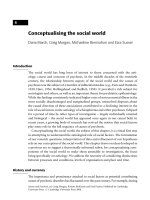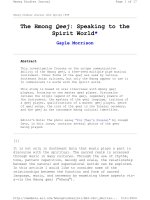The first world war
Bạn đang xem bản rút gọn của tài liệu. Xem và tải ngay bản đầy đủ của tài liệu tại đây (3.62 MB, 162 trang )
europe in 1914
The European Powers in 1914
With a few marginal changes, the ‘Great Powers’ of Europe
(as they were still called) were much the same as they had
been for the previous two centuries, but the balance between
them had changed radically. The most powerful of all was
now the German Empire, created by the Kingdom of Prussia
as a result of its victorious wars of 1866 against the Austrian
Empire and 1870 against France. France had been reduced
by her defeat to second-rank status and resented it. The polyglot lands of the Austrian Empire had been reorganized
since 1867 as the Dual Monarchy of Austria-Hungary, and
accepted subordinate status as an ally of Germany. Although
Hungary was a quasi-autonomous state, the Monarchy was
often referred to simply as ‘Austria’ and its peoples as
‘Austrians’, much as the United Kingdom was commonly
known abroad as ‘England’ and its people ‘English’. Flanking these continental powers were two empires only partially
European in their interests: the huge semi-Asiatic Russian
Empire, a major if intermittent player in south-east Europe;
and Britain, whose main concern was to maintain a balance
of power on the Continent while she expanded and consolidated her possessions overseas. Spain, the last vestiges of
whose overseas empire (apart from a coastal fringe of North
Africa) had been lost to the United States at the beginning of
the century, had dwindled to third rank. Her place in the cast
had been taken by an Italy whose unification under the
House of Savoy between 1860 and 1871 had been more
apparent than real, but whose nuisance value alone won her
the wary respect of the other powers.
Until the end of the eighteenth century, these powers had
2
europe in 1914
been socially homogeneous. All were still primarily agrarian
societies dominated by a landed aristocracy and ruled by
historic dynasties legitimized by an established Church. A
hundred years later all this had either been completely
transformed or was in the course of rapid and destabilizing
transformation; but the pace of change had been very
uneven, as we shall see.
Britain
Britain had led the way. By the beginning of the twentieth
century she was already a fully urbanized and industrialized
nation. The landed aristocracy remained socially dominant,
but the last vestiges of political power were being wrested
from it by a House of Commons in which the two major
parties competed for the votes, not just of the middle, but
increasingly, as the franchise was extended, of the working
classes. A liberal–radical coalition came to power in 1906 and
began to lay the foundations of a welfare state, but it could
not ignore the paradoxical predicament in which Britain
found herself at the beginning of the century. She was still
the wealthiest power in the world and the proud owner of the
greatest empire that the world had ever seen; but she was
more vulnerable than ever before in her history. At the hub
of that empire was a densely populated island dependent on
world trade for its wealth and, yet more important, for
imported foodstuffs to feed its cities. The Royal Navy’s
‘command of the seas’ both held the Empire together and
ensured that the British people were fed. Loss of naval
supremacy was a nightmare that dogged successive British
3
europe in 1914
governments and dominated their relations with other
powers. Ideally they would have wished to remain aloof from
European disputes, but any indication that their neighbours
were showing signs, singly or collectively, of threatening their
naval dominance had for the previous twenty years been a
matter of anguished national concern.
France
For over a century, between 1689 and 1815, Britain’s
major rival for world power had been France, and it
had taken nearly another 100 years for her to realize that
this was no longer the case. France had lagged far behind
in the economic development that could have made her a
serious competitor. The Revolution of 1789 had destroyed
the three pillars of the Ancien Régime—monarchy, noblesse,
and Church—and distributed their lands among peasant
smallholders who remained staunchly resistant to any development, whether reaction or further revolution, that threatened to expropriate them; and their pattern of life did not
encourage either the growth of population or the accumulation of capital that made economic development possible. In
1801 the population of France had totalled twenty-seven million and was the largest in Europe. In 1910 it was still only
thirty-five million, whereas over the same period that of
Britain had risen from eleven million to forty million, while
that of the newly united Germany was over sixty-five million
and still rising. After its demoralizing defeat in 1870, the
French army had found an outlet in African conquests that
created friction with Britain’s imperial interests, as did
4
europe in 1914
traditional rivalries in the eastern Mediterranean, but for the
French people these were marginal issues. They remained
deeply divided between those who had profited from the
Revolution; those who, under the leadership of the Catholic
Church, still refused to come to terms with it; and an increasingly powerful socialist movement that wanted to push it a
stage further. France remained both wealthy and culturally
dominant, but her domestic politics were highly volatile.
Abroad, the German annexation of Alsace and Lorraine in
1871 had been neither forgotten nor forgiven, and fear of
German power made France anxiously dependent upon her
only major ally—Russia.
Russia
The other continental rival feared by Britain in the nineteenth century was the huge Russian Empire, whose expansion to the south and east threatened both the route to India
through the Middle East (which had led Britain to prop up
the moribund Turkish Empire) and the frontiers of India
itself. Certainly Russia’s potential was (as it remains) enormous, but it was limited (as it still is) by the backwardness of
its society and the inefficiency of its government.
Capitalism and industrialization came late to Russia, and
then largely as a result of foreign investment and expertise.
At the beginning of the twentieth century the Czars ruled
over a population of 164 million, consisting overwhelmingly
of peasants who had been emancipated from actual serfdom
only a generation earlier. They still exercised an absolutism
such as Western Europe had never known—supported by an
5
europe in 1914
Orthodox Church untouched by any Reformation, and
through the instrumentality of a vast and lethargic bureaucracy. The educated elites were divided between ‘Westerners’, who, looking to Europe as a model, were attempting
to introduce economic development and responsible government, and ‘Slavophiles’, who considered such ideas
degenerate and wished to preserve historic Slav culture. But
successive military defeats—at the hands of the French and
British in 1855–6 and the Japanese in 1904–5—drove
home the lesson learned by Peter the Great, that military
power abroad depended on both political and economic
development at home. Serfdom had been abolished after the
Crimean War, and representative institutions of a kind introduced after defeat and near-revolution in 1905. Railway
development had enormously boosted industrial production
in the 1890s, bringing Russia, in the view of some economists, to the point of economic ‘take-off’. But the regime
remained terrified that industrial development, however
essential it might be for military effectiveness, would only
encourage demands for further political reform, and it suppressed dissidents with a brutality that only drove them to
extremes of ‘terrorism’ (a term and technique invented by
Russian revolutionaries in the nineteenth century), thus justifying further brutality. This made her an embarrassing,
even if a necessary, ally for the liberal West.
At the end of the nineteenth century the attention of the
Russian government had been focused on expansion into
Asia, but after its defeat by the Japanese in 1904–5 it was
switched to south-east Europe, which was still dominated by
the Ottoman Empire. There national resistance movements,
originally based on the Orthodox Christian communities in
6
europe in 1914
Greece, Serbia, and Bulgaria, had traditionally looked to
the Russians for sponsorship—first as fellow-Christians,
then as fellow-Slavs. All three had established independent
states in the course of the nineteenth century. But there
were also large numbers of Slavs, especially of Serbs and
their cousins the Croats, in Austria-Hungary; and, the
more successful the new Slav nations were in establishing
their identity and independence, the more apprehensive
the Habsburgs became about the increasing restiveness of
their own minorities, and the part played by Russia in
encouraging it.
Austria-Hungary
In Western Europe—Britain, France, Germany, Italy, even
Russia—nationalism was a cohesive force, though such ‘submerged nations’ as the Poles and the Irish were already
struggling for independence. But the Habsburg Monarchy
consisted entirely of ‘submerged nations’. In the eighteenth
century there had been a dominant German elite, but even
for the Germans there was now an adjacent homeland in the
new German Empire to the north. In 1867 the Habsburg
Empire had transformed itself into the ‘Dual Monarchy’ by
granting the most powerful submerged nation, the Magyars,
quasi-independence in the Kingdom of Hungary, which
shared with the dominantly German ‘Austrians’ only a monarch (the Emperor Franz-Joseph, who had ruled since 1848),
an army, a treasury, and a foreign office. The Magyars, like
the Germans (and indeed the British, whom they greatly
admired and whose parliament building they imitated in
7
europe in 1914
Budapest), considered themselves a master race, and they
ruled oppressively over their own Slav minorities—Slovaks,
Rumanians, and Croats. In the western half of the Monarchy
the German ‘Austrians’ ruled not only Slavs to the north
(Czechs), north-east (Poles and Ruthenes), and south
(Slovenes and Serbs), but Italian-speaking lands on the
southern slopes of the Alps coveted by the new Kingdom of
Italy. Unlike the tough Magyar squireens of Budapest, the
rational bureaucrats of Vienna tried to treat their subjectnationalities tolerantly and granted them equal rights with
the Germans. The result was to paralyse the machinery of
government in Vienna and force the Emperor to rule by
decree. Its rich mixture of cultures certainly made Vienna a
city with a uniquely vibrant intellectual and artistic life, but its
intelligentsia looked to the future with apprehension and
occasionally despair.
Germany
Finally there was Imperial Germany, the most complex and
problematic power of them all.
The unification of Germany in 1871 had created a nation
that combined the most dynamic economy in Europe with a
regime that in many respects had hardly emerged from feudalism. The Hohenzollern dynasty had ruled Prussia through
a bureaucracy and an army that were both drawn from a
‘service gentry’ (Junkers) rooted primarily in their eastern
provinces. They resented the very existence of a Reichstag
(parliament) that had been unsuccessfully aspiring to power
8
europe in 1914
ever since the middle of the nineteenth century. In the newly
united empire the Reichstag represented the whole range of
the enlarged German population: agrarian conservatives
with their vast estates in the east, industrialists in the north
and west, Bavarian Roman Catholic farmers in the south,
and, increasingly as the economy developed, the industrial
working classes, with their socialist leaders, in the valleys of
the Rhine and the Ruhr. The Reichstag voted the budget,
but the government was appointed by, and was responsible
to, the monarch, the Kaiser. The chief intermediary between
Reichstag and Kaiser was the Chancellor. The first holder of
that office, Otto von Bismarck, had used the authority he
derived from the Kaiser to make the Reichstag do his own
bidding. His successors were little more than messengers
informing the Reichstag of the Kaiser’s decisions and manipulating them to ensure the passage of the budget. By the
Kaiser himself they were seen almost as household servants,
of considerably less importance than the Chief of the
General Staff.
Under these circumstances the personality of the Kaiser
was of overwhelming importance, and it was the misfortune
not only of Germany but of the entire world that at this
juncture the House of Hohenzollern should have produced,
in Wilhelm II, an individual who in his person embodied
three qualities that can be said to have characterized the contemporary German ruling elite: archaic militarism, vaulting
ambition, and neurotic insecurity.
Militarism was institutionalized in the dominant role that
the army had played in the culture of the old Prussia it had
dominated and had to a large extent created; much as its
victories over Austria and France had created the new
9
1 Kaiser Wilhelm II: the incarnation of ‘Prussian militarism’
europe in 1914
German Empire. In the new Germany the army was socially
dominant, as it had been in the old Prussia—a dominance
spread throughout all classes by three-year universal military
service. The bourgeoisie won the cherished right to wear uniform by taking up commissions in the reserve, and imitated
the habits of the Junker military elite. At a lower level, retired
NCOs dominated their local communities. The Kaiser
appeared always in uniform as the All Highest War Lord,
surrounded by a military entourage. Abroad, this militarism,
with its constant parades and uniforms and celebrations of
the victories of 1870, was seen as absurd rather than sinister;
and so it might have been if it had not been linked with the
second quality—ambition.
Bismarck himself, having created the German Empire, had
been content simply to preserve it, but the successor generation was not so easily satisfied. It had every reason to be
ambitious. It constituted a nation over sixty million strong
with a superb heritage of music, poetry, and philosophy, and
whose scientists, technologists, and scholars (not to mention
soldiers) were the envy of the world. Its industrialists had
already surpassed the British in the production of coal and
steel, and together with the scientists were pioneering a new
‘industrial revolution’ based on chemicals and electricity.
The Germans prided themselves on a uniquely superior culture that held the balance between the despotic barbarism
of their eastern neighbours and the decadent democracy
of the West. But within this proud, prosperous, and successful nation a deep cleavage was developing, which only
grew deeper as its prosperity increased. The growth of its
industries increased the size and influence of a working
class whose leaders, while no longer revolutionary, were
11
europe in 1914
increasingly pressing for an extension of democracy and the
abolition of social privilege, and whose party, the Social
Democrats, had become by 1914 the largest in the Reichstag.
The possessing classes had their own quarrels, mainly
between the landowners of the east and the industrialists of
the west, but they made common cause against what they saw
as a socialist revolutionary threat. From the beginning of the
twentieth century they began to combat it by a ‘forward policy’ based on the assertion of ‘national greatness’. With the
Kaiser at their head, German right-wing political leaders
began to claim for Germany the status, not only of a Great
Power, but of a World Power, Weltmacht. The only competitor
in that class was the British Empire; but if she was to compete
with Britain, Germany needed, not only a great army, but a
great fleet. To raise money for such a fleet a major propaganda exercise was necessary; and that propaganda could be
effective only if Britain was depicted as the next great adversary that the Germans must overcome if they were to achieve
the status that they believed to be rightfully their due.
The Rival Alliances
Germany already saw herself surrounded by enemies. When
Bismarck created the German Empire in 1871, he knew
very well that the natural reaction of her neighbours would
be to unite against her, and he took care to see that this did
not happen. France, with good reason, he regarded as
irreconcilable, if only because she had been compelled to
surrender her provinces of Alsace and Lorraine. He therefore tried to neutralize her by encouraging the colonial
12
europe in 1914
ambitions that would bring her into conflict with Britain, and
ensured that she could find no allies among the other powers
of Europe by binding them all into his own system of alliances. The Dual Monarchy presented no difficulty. Beset
with internal problems, she had been happy to conclude the
Dual Alliance with Germany in 1879. Her own natural enemy
was the newly unified Italy, who coveted the Italian-speaking
lands on the southern slopes of the Alps and at the head of
the Adriatic that still remained in Austrian hands; but Bismarck linked both into a Triple Alliance by supporting Italian territorial claims against France and her Mediterranean
possessions.
There remained the two flanking powers, Russia and Britain. Russia would be a formidable ally for the French if given
the chance, which Bismarck was determined that she should
not have. He had been careful to cultivate her friendship and
had linked her into his ‘system’ by an alliance concluded in
1881 and renewed, as a ‘Reinsurance Treaty’, six years later.
As for Britain, France and Russia were her natural adversaries, so to have them held in check by a strong central power
suited British statesmen very well. The one thing that Bismarck had good reason to fear was a war in the Balkans
between Austria and Russia that might upset the balance that
he had so precariously established. At the Congress of Berlin
in 1878 he brokered an agreement that divided the Balkans
into spheres of influence between Russia and the Dual Monarchy, and gave to the latter a ‘Protectorate’ over the most
northerly and turbulent of the Ottoman provinces, BosniaHerzegovina. This settlement produced an uneasy peace that
lasted until the end of the century, but Bismarck’s ‘system’
had begun to unravel long before then.
13
europe in 1914
Bismarck’s successors, for a whole complex of reasons,
failed to renew the treaty with Russia, thus leaving her available as an ally for France. It was a terrible mistake. For Russia,
if this newly powerful Germany was not an ally, she was a
threat, and one that could be countered only by a military
alliance with France. France was in any case a plentiful source
of the investment capital that Russia needed to finance the
modernization of her economy. So in 1891 the two powers
concluded a treaty, the Dual Entente, to confront the Triple
Alliance, and the rival groups began to compete in the
enhancement of their military power.
The British initially regarded this alliance between her
traditional adversaries with alarm, and the dynamics of
international relations would normally have dictated an alliance with Germany as a natural consequence. That this did
not happen was due partly to the traditional British
reluctance to become involved in any entangling continental
alliances, and partly to extraordinarily clumsy German diplomacy. More important than either, however, was the German decision that we have already noted, to build a navy that
could challenge the British command of the seas.
Given that she already had the most powerful army in the
world, it was not immediately evident—at least not to the
British—why Germany needed an ocean-going navy at all.
Hitherto, in spite of industrial competition, British relations
with Germany had been friendly rather than otherwise. But
now there began a ‘naval race’, for quantitative and qualitative superiority in ships, that was to transform British public
opinion. By 1914 Britain had pulled decisively ahead, if only
because she was prepared to devote greater resources to
shipbuilding and did not need, as did the Germans, to sus14
europe in 1914
tain the burden of an arms race by land as well. But the
British remained concerned not so much with the fleet that
Germany had already built as with that which she yet
might—especially if a successful war gave her military
hegemony over the Continent.
So Britain mended her fences with her traditional rivals. In
1904 she settled her differences with France in Africa, establishing a relationship that became known as l’entente cordiale.
There remained the Russian Empire, whose southward
expansion towards the frontiers of India had given Victorian
statesmen continual nightmares, and had led the British in
1902 to conclude their first formal alliance for a nearly a
century with the emerging power of Japan. Three years later
Russia was defeated and brought to the verge of revolution by
war with Japan, so in 1907 she was happy to conclude an
agreement with Britain over the disputed borderlands of
Persia and Afghanistan, thus creating a ‘Triple Entente’.
Beyond Europe, Britain took care to remain on friendly
terms with the United States. American appetite for naval
expansion had been whetted by victory over Spain in 1899
and annexation of her possessions in the Pacific, but British
statesmen realized that America’s immense resources meant
that confrontation with her should be avoided at almost
any cost. So traditional rivalries were appeased by the virtual
abandonment of a British naval presence in the western
hemisphere and the careful cultivation of a harmony
between British and American elites based on ‘Anglo-Saxon’
consanguinity and shared political values.
Although Britain concluded no formal alliances except
that with Japan, the Germans complained that the British
were weaving a web to encircle and imprison them, and
15
europe in 1914
relations grew steadily worse. In 1911, when the Germans
attempted to humiliate the French by challenging their
influence in Morocco with a naval demonstration off Agadir,
the British made their support for the French explicit. Many
people in Britain and Germany began to regard each other
as natural enemies, and war between them as inevitable.
But, when war did break out three years later, it was at the
other end of Europe, in the Balkans, as Bismarck himself had
gloomily foreseen.
The Balkan Crises
Without Bismarck’s calming hand, relations between AustriaHungary and Russia had deteriorated as badly as those
between Britain and Germany. The Balkan state that the
Austrians most feared was Serbia, especially since their protectorate over Bosnia-Herzegovina had placed many Serbs
under Austrian control. In 1903 a coup d’état in Belgrade
had overthrown the Obrenovic dynasty that had pursued a
course of conciliation towards the Dual Monarchy, and
replaced it with a regime dedicated to the expansion of
Serbia through the liberation of Serbs under foreign rule—
especially those in Bosnia. Five years later Austria formally
annexed Bosnia-Herzegovina to facilitate her control over
those provinces. The Serb government responded by creating
an open ‘liberation movement’ for Bosnian Serbs with a
covert terrorist wing, ‘the Black Hand’, trained and supported by elements within the Serb army. At the same time,
Serbia, with Russian encouragement, took the lead in
forming a ‘Balkan League’ with Greece, Bulgaria, and
16
europe in 1914
Montenegro, dedicated to the final expulsion of the Turks
from the peninsula. Their opportunity came in 1912, when
the Turks were engaged in defending their territories in
Libya against an attack by Italy, whose government had
grandiose ambitions (anticipating those of Mussolini a generation later) to restore the glories of the Roman Empire. In
the First Balkan War of that year the Balkan allies drove the
Turks from the entire peninsula except a bridgehead round
Adrianople. A second war was fought the following year
between the victorious allies over the division of the spoils.
As a result of these two wars, the territory and population
of Serbia were doubled and her ambitions hugely encouraged. But in Vienna the reigning emotions were fear and
frustration: fear at the apparently unstoppable march of
Serbia, with all the encouragement this gave to Slav dissidents in both halves of the Monarchy; and frustration at their
inability to do anything about it. Then on 28 July 1914 the
heir to the Habsburg throne, Archduke Franz Ferdinand,
was assassinated in Sarajevo, the capital of BosniaHerzegovina, by Gavril Princip, a teenage terrorist trained
and armed by the Serb-sponsored Black Hand.
17









